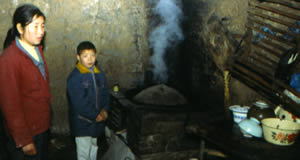Objective 3: "Enhance food security and nutrition, especially at the household level"
Under this objective, the UN system will provide assistance in two major areas: a) support to sustainable agricultural development as a means to enhance national food security; and b) interventions targeted to the most vulnerable communities to eradicate household food insecurity. In addition, the UN will assist the Government develop appropriate policies to respond to foreseeable changes brought about by China's entry into WTO.
 Although
the Government has reached its target of 95% food self-sufficiency at the
national level, there are large disparities at the sub-national level. Production
disparities per capita exist across regions due to differentials in land productivity,
access to inputs, technology, climate and exposure to natural hazards. Supply
disparities are caused by weak or insufficient market demands, incomplete
marketing, missing links in transportation and storage infrastructure and
price distortions. Even where food availability is sufficient, access disparities
mainly due to low incomes and difficult access to markets prevent people
from acquiring enough food to meet their minimum energy and nutrient requirements.
Food insecure populations usually have an annual food gap of 3 5 months.
Although
the Government has reached its target of 95% food self-sufficiency at the
national level, there are large disparities at the sub-national level. Production
disparities per capita exist across regions due to differentials in land productivity,
access to inputs, technology, climate and exposure to natural hazards. Supply
disparities are caused by weak or insufficient market demands, incomplete
marketing, missing links in transportation and storage infrastructure and
price distortions. Even where food availability is sufficient, access disparities
mainly due to low incomes and difficult access to markets prevent people
from acquiring enough food to meet their minimum energy and nutrient requirements.
Food insecure populations usually have an annual food gap of 3 5 months.
WTO entry and its effects - It is expected that China’s entry into WTO will result in a reduction of domestic cereal prices. Although it may have an immediate negative impact, particularly on middle-income farmers who produce wheat and rice for income, low cereal prices may translate into increased accessibility for subsistence farmers and hungry poor (provided that the goods do reach the market and that it has transparent pricing). It will also discourage the current trend of utilising excessive agricultural inputs and precious water resources simply for the cultivation of cereals, freeing up the land for other, more appropriate uses, such as the farming of cash crops and/or livestock. WTO entry will necessitate a readjustment in agricultural policy, such as the diversification of production, publicising market prices, market transparency, quality improvement and a reform of land tenure and farm taxation. The UN and the World Bank will provide support to national decision-makers in this crucial transition process.
Improved agricultural infrastructure, particularly for the poor - Furthermore, the UN system will support the Government in improving agricultural infrastructure and service systems and enhancing protection of agricultural environment and resources (e.g. land quality development, enhanced adoption of IPNS, IPM, and integrated land-water management). Development of policies and initiatives that diversify farming and rural production systems to improve sustainable land use and the sustained ability of agricultural households to generate income (including off-farm employment) will be encouraged, while assistance will be given in targeting the most vulnerable communities and support initiatives to eradicate poverty and household food insecurity, now mostly concentrated in the mountainous remote areas in the Western provinces. In this connection, promotion of environmentally-friendly livestock and dairy production for augmentation of household incomes and as one solution to child malnutrition and micronutrient deficiencies will be encouraged. Other issues include improved agricultural infrastructure including access to financial credit, technology, information and training particularly for poor farmers and women. The land tenure system should be re-examined, taking into consideration the fact that women increasingly shoulder the burden of agricultural production. Rural women and children are the most vulnerable and disadvantaged in gaining access to resources, and considerable investment to build skills and develop non-subsistence crop production is needed to help them out of poverty.
Nutrition training for women - Specific UN interventions in the field of nutrition will reactivate the successful implementation of an interagency programme on prevention of iodine deficiency and target the elimination of vitamin A deficiency. The UN will support education of rural women in basic nutrition practices which is a high return activity in reducing child malnutrition and micronutrient deficiencies. Although the UN is intending to decrease its financial support to this area during the period under review, it is expected that government cost-sharing will increase, thus maintaining the current programme level. The UN will also start promoting greater men's involvement that can contribute to an even higher return in child care.
HOME
| ABOUT
CHINA | RC
SYSTEM | THEMES
| WORKING
TOGETHER
PARTNERS
| GOALS
| EVENTS
| NEWS | CONTACT
US | SITE
MAP
